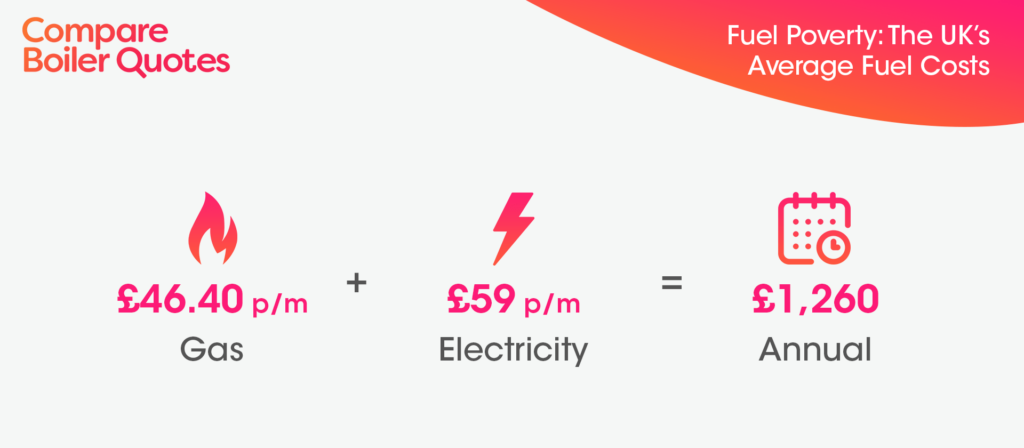Your basket is currently empty!
Written by
How to reduce fuel poverty?

Fuel poverty is a major economic issue that affects approximately 13% of households in England, 25% of households in Scotland, 12% of households in Wales, and 42% of households in Northern Ireland. Fuel poverty not only makes everyday life uncomfortable, but it can also be fatal for the elderly.
Despite the fact that many of us are now laser-focused on lowering our carbon footprint through increased energy efficiency, there are still thousands of people who do not have access to central heating. To learn more about fuel poverty, including what it is and how to avoid it, continue reading as we go over the topic in greater depth.
Get your Fixed Price Boiler Quotes Online
New Gas Boilers with £0 Deposit & 0% Interest Finance Availble
Get the best quotes for boiler installation online in under 1 minute now
What actually is Fuel Poverty?
Most of us would define fuel poverty as the inability to keep your home warm. However, there is an official definition: a household is considered fuel-poor if it has above-average energy costs and paying those costs would push it below the poverty line in terms of remaining income.
The poverty fuel gap is another term for this. This is the difference between a fuel-poor household’s energy bill and the size of the bill required to avoid being labelled as fuel-poor.
In 2013, the UK government released a document outlining its findings on fuel poverty across the nation. This document states that homes are now categorised as being in fuel poverty if: a home’s income is below the poverty line once energy costs are paid for; and if a home’s energy costs are above the national average.
This definition is used primarily within England and parts of Wales, whilst Scotland and Northern Ireland mostly use the old definition: a household is fuel-poor if the cost of heating is more than 10% of its income.
Get your Fixed Price Boiler Quotes Online
New Gas Boilers with £0 Deposit & 0% Interest Finance Availble
Get the best quotes for boiler installation online in under 1 minute now
Who is impacted by fuel poverty?
Fuel poverty affects the unemployed, those with low incomes, and those who live in energy-inefficient housing.
According to the government, energy price caps have helped to reduce energy costs, and the implementation of the National Living Wage has helped to increase the income of low-income families.
It also claims that progress is being made in increasing the number of low-income households living in energy-efficient housing.
The Fuel Poverty Energy Efficiency Rating system assesses a property’s energy efficiency, rating it from A to G, with A being the most efficient and G being the least efficient.
What Causes Fuel Poverty?
The direct cause of fuel poverty varies, but it is often thought to be linked towards unemployment, rising energy bills and poorly insulated homes.
- Fuel prices: as expected, play a significant role in fuel poverty. Under normal circumstances, the price caps imposed by Ofgem, the energy market regulator, reduce our energy bills slightly. However, due to unprecedented circumstances in the energy market, the cost of energy has risen over the last year. The price cap rose by 26% from £1,971 to £2,500 in October 2022, in accordance with the government’s Energy Price Guarantee scheme.
- Household income: Lower-income households are more likely to spend a larger portion of their budget on fuel, resulting in a household with insufficient income falling below the poverty line.
- Energy efficiency: There is a greater chance of energy waste in homes that do not use energy efficiently. This means that households will have to spend more money to keep their homes warm.
What is The Average Cost of Heating Per Month?

The UK’s average utility bill comes in at around £1,260 per year or £105 per month. This cost is made up of a monthly gas bill of £46, and an electricity bill of £59.
Comparing these numbers to the average income of the UK’s poverty line, it quickly becomes obvious why so many people need help with gas and electric bills.
As per current Universal Credit criteria, a single person under the age of 25 is entitled to £257.33 per month, this raises to £324.84 if over the age of 25, and can reach as high as £509 as a couple. This means that energy costs can be up to 40% of a household’s income each month.
Get your Fixed Price Boiler Quotes Online
New Gas Boilers with £0 Deposit & 0% Interest Finance Availble
Get the best quotes for boiler installation online in under 1 minute now
Why Fuel Poverty is bad?
Each winter, fuel poverty kills thousands of people in the United Kingdom. It means being unable to afford to heat a home to a safe and comfortable temperature, which typically occurs when 10% or more of a household’s net income is spent on fuel. It harms our health, happiness, and educational attainment, as well as creating problems for people to participate in society and the economy.
Fuel poverty has affected approximately 10% of UK households, or millions of homes, for decades. The cost of living crisis, including a spike in gas prices as a result of many external factors, has resulted in an increase in the number of households unable to afford heat and electricity this year.
How to Avoid Fuel Poverty

Thankfully, there are some steps that can be taken in order to avoid fuel poverty. Here are some of the ways in which energy costs can be reduced to make them more affordable:
Changing Energy Tariffs
One of the simplest ways to reduce energy costs is by changing energy providers or tariffs. While energy prices are primarily driven by global markets, this does not mean that consumers should be paying extortionate rates.
Changing providers takes as little as two weeks and will not interrupt the energy supply. This can save upwards of £80 per year, depending on location and energy usage.
Energy Grants and Schemes
Warm Home Discount
Another easy way of cutting back on energy costs is to apply for a Warm Home Discount via your energy supplier. This provides £140 of credit to your account in order to help cover fuel costs in the winter months.
Check if you’re eligible by visiting the UK government website.
Insulation and Boiler Grants
Certain energy suppliers will contribute to additional work within your home to make it more energy efficient. These upgrades can come in the form of a free boiler grant or through the installation of cavity wall insulation.
NHS Worker Discount
At Green Central, we believe in giving back. As a thank you to the hardworking NHS staff across the UK, we offer a £25 NHS worker discount off all new boilers by using the code ‘NHS’ during checkout.
Installing Smart Meters
Smart meters are quickly being rolled out across the UK as part of an effort towards reducing energy spend and providing greater vigilance over usage.
Whilst smart meters are not mandatory, they do provide many benefits like real-time energy monitoring, as well as sending accurate bills to ensure homeowners only pay for what they use.
Upgrading Your Boiler
By far one of the most effective ways of avoiding potential fuel poverty is to install a newer, more efficient boiler.
Thanks to both rising technical proficiency and recent developments in boiler technology, condensing gas boilers can be manufactured to be upwards of 90% efficient to help waste as little fuel as possible. When compared to older boilers, A-Rated boilers can potentially save over £300 per year on heating costs.
Having Trouble Upgrading? -Compare Today
While the effects of fuel poverty can be dire, Green Central is on a mission to make replacing an old boiler more affordable.
In addition to offering some of the lowest prices on the market, our main objective is to allow everyone to upgrade their boiler in an easy, cost-effective way. If you’re having trouble covering the upfront cost, then paying for your boiler on finance allows you to spread payments over many months.
See how much you could save by running a quick price comparison with Green Central.
Get your Fixed Price Boiler Quotes Online
New Gas Boilers with £0 Deposit & 0% Interest Finance Availble
Get the best quotes for boiler installation online in under 1 minute now
Written by
Get your Fixed Price Boiler Quotes Online
New Gas Boilers with £0 Deposit & 0% Interest Finance Availble
Get the best quotes for boiler installation online in under 1 minute now





